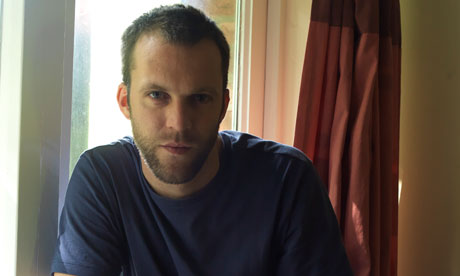Experience: I went to prison for going awol
'This wasn't a war about liberation, it was about strategic influence; about economics and mineral wealth'
-
Joe Glenton
The Guardian,

'I've found a real passion for
antagonising the state, and I'm going to keep at it.'
Photograph: Tessa Bunney for the Guardian
I was 22 when I joined the army. It was always an ambition and I believed the army was a force for good, helping developing nations become more stable. I wanted to be involved in that.
My first operation was Afghanistan in 2006. I'd never even been on a plane before, so everything felt new and exciting. We all wanted to get out there and prove ourselves.
We were logistics specialists based in Kandahar, working with combat supplies. I remember one evening a rocket whistled overhead and hit. We came rushing out of our tent, and could see civilians lying on the ground. I was torn – I wanted to help, but we weren't allowed to leave our fortified camping area. Later, we dealt with the aftermath of the Nimrod air crash, where faulty equipment caused the deaths of 14 people. I remember seeing all those coffins laid out and thinking, what a pointless waste of life.
On tour, you try to shove feelings of doubt to one side. But one day a comrade said, "Why are we here?" and the question hung around. Nobody seemed to know. I suppose all young soldiers are naive. The culture of the army is obedience, and you believe your government has your best interests at heart. But when I returned home after seven months, I was determined not to be blind any more. I read about the history of the conflict and began to realise I had been duped. This wasn't a war about liberation, it was about strategic influence; about economics and mineral wealth.
At the same time I started experiencing nightmares and anxiety caused by PTSD [post-traumatic stress disorder]. I started drinking to get to sleep. I told the army, but I didn't feel I was offered proper support. At least I knew I wouldn't be going back to Afghanistan. I was protected by "harmony" guidelines – the 18-month gap between tours. I decided to keep everything to myself and get on with my job, then sign off when I could.
But after seven months, I was told I had to go back. I raised my objections with my commander and told him I didn't agree with the war. He called me a coward and said, "You're a soldier, you go where you're told." By that time, we were on build-up training to go on tour, so I faced a stark choice. I booked a cheap flight to Bangkok and left.
My plan was to spend a month there, get some space and come home, but I fell apart. I started drinking and taking drugs, and drifted around Asia before ending up in Australia. It was there I met my wife and began to get myself back together. Eventually I called the awol hotline in the UK. I'd been gone for a year and a half. It was such a relief to talk after being silent for so long. Six months later we flew home.
It was tense and strange going back to the army base. The next day, I was charged with going awol and put back in my old job. I didn't want to tell my colleagues what had happened, but when the army raised the charge to desertion – which can carry a sentence of up to 10 years – I decided to make a stand. I spoke to the papers, and in front of 500 people at a Stop the War meeting. The army were shocked. They just kept promising me I'd go to prison.
The sentencing took nine months, and in the meantime I built up a case with my lawyers on the legality of the conflict. It was clear the army didn't want a public examination because, all of a sudden, the charges for desertion were dropped.
In the end, I spent nine months in Colchester Military Corrective Training Centre. I had massive support inside. I remember this big, scary commando coming over. I thought, uh-oh. He said, "You're that guy, aren't you? Good egg, good lad."
What happened to me isn't unusual: 11,000 have gone awol since 2003, but the army keep it quiet. The public needs to know because they're paying for courts martial and military prisons. They need to know why people are refusing to fight.
I've found a real passion for antagonising the state, and I'm going to keep at it. I'm off to university to study International Relations with Peace and Conflict studies. After everything that's happened, I still love the army. I'll miss the banter and the culture. And I'm proud of myself for joining up in the first place. I wanted to improve things, and went out to Afghanistan for all the right reasons. It's a shame these conflicts are being fought for all the wrong ones.
• As told to Becky Barnicoat.